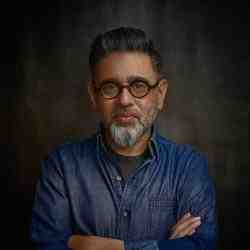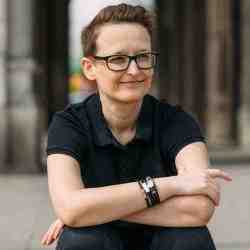Introduction
Rodrigo Baggio spearheads a rapidly growing movement to equip young people in low-income communities with computer skills and thus to expand their job opportunities and their access to modern society.
The New Idea
Fascinated by computers from an early age, Rodrigo Baggio is providing young people in favelas and other low-income communities with computer skills. After a highly successful pilot training program in two favelas in Rio de Janeiro in early 1995, Rodrigo and a small group of volunteer associates formed a permanent organizational structure for the work, which is growing explosively.
Rodrigo has developed training courses, which typically involve two several-hour sessions per week over a three-month period. They are staffed by residents of the communities in which they are offered. The program provides the teachers with the needed training and then pays them a salary of roughly $200 per month (more than twice the average salary of a teacher in the public school system). The students, most of whom are in their teens or early twenties, pay a fee of approximately $10 per month for instruction that includes word processing, accounting programs, spreadsheets and computer graphics. The classes are held in rooms made available without charge by churches, community organizations and schools in or near the targeted communities. Rodrigo has attracted enthusiastic support from business firms, which donate the computers and training manuals that the program uses; and the computers are maintained by talented and dedicated volunteer members of the program's directive committee.
Although a systematic evaluation of the program's outcomes has not yet been attempted, there is growing anecdotal evidence of its success on several fronts. Many of its youthful favela participants have found new, well-paying jobs, and others have been promoted to assignments that would not have been open to them without computer skills. Rodrigo and his associates also cite many cases in which participants have developed renewed interest in formal schooling, resisted strong lures to join drug gangs or participate in other illicit activities and otherwise manifested heightened self-esteem. In addition, many of the program's "graduates" are putting their computer skills to work in various community activities, including health education and AIDS awareness campaigns.
Not surprisingly, in light of such successes, the program has elicited immense and broad ranging interest. In each of the communities in which it is currently working, the numbers of young people eager to enter the program have far exceeded expectations, and several of the program's sites are now offering instruction on a three-shifts-per-day basis. The program has attracted considerable media attention, and scores of additional low-income communities (in Rio de Janeiro and elsewhere in the country) are eagerly seeking its services. Support from the business community, in the form of donated equipment and financial contributions, is brisk, and government agencies are also providing modest subsidies for the program's expansion into additional communities.
The Problem
Computers and computer-based communications and information systems are opening up new opportunities in virtually every field of human endeavor. Distances of many kinds are being erased, and the "global village" is becoming more of a reality with each passing day. In education, in the workplace, and in many leisure pursuits, the computer embodies the fundamental difference between yesterday and today.
Unfortunately, however, the benefits of this remarkable tool are not being evenly shared. In countries like Brazil, where poverty is widespread and public education systems are extremely deficient, both the high cost of computer hardware and limited opportunities for training in computer skills deny access to those benefits to most people of modest economic means. As a result, in several important respects the gulf between the "haves" and the "have-nots" is widening, and with that widening, the opportunities open to economically disadvantaged groups are correspondingly curtailed.
The essence of the challenge that Rodrigo and his colleagues are addressing, therefore, is the urgent need to broaden access to computer and information science skills and, through those skills, to improve economic opportunities and more fruitful participation in virtually every dimension of modern life. The campaign in which Rodrigo and his associates are engaged is at the forefront of the continuing battle for social justice. It is also of central relevance for the future of democratic governance in Brazil.
The Strategy
In its first two years of operation, the program has grown at a remarkable rate. From pilot initiatives in two favelas in early 1995, its "schools of computer science and citizenship" were in operation in some fifteen sites in the Rio de Janeiro metropolitan area by the end of that year, and another eight sites were added by mid-1996. In addition, ten such schools were launched in 1996 in other parts of the country (two in São Paulo, two in Minas Gerais, four in Paraná and two in Bahia). By early 1997, more than 5,000 participants had completed its three-month courses.
The engine behind the rapid expansion is a "Committee for the Democratization of Computer Science"-a 40 member volunteer group that is now being transformed into a nongovernmental organization, with subgroups or nuclei in various parts of the country. At the request of community groups in favelas and other low-income communities, committee members assist the establishment of computer schools in a carefully devised and systematic process that includes feasibility studies; teacher training; the provision, installation and maintenance of donated hardware; and counsel in developing a plan for making the school self-supporting.
Rodrigo's strategy places strong emphasis on the self-management, financial independence and sustainability of each of the growing number of computer schools. The funds required for teachers' salaries and facilities maintenance are generated in large measure from student fees, but other income sources may also be part of the school's financial plans. In some instances, for example, graduates are encouraged to use school equipment (when classes are not in session) to provide various services to community groups or small local businesses on a fee-for-service-rendered basis. Much of the income thus generated is retained by the individuals who provide the services, but a portion is returned to the school for use in renewing or expanding its computer equipment or extending its program activities.
To assure the efficiency of its ongoing activities and develop plans for the geographic and programmatic expansion of his initiative, Rodrigo has established nine working groups under the aegis of the Committee. One such group, which includes several teachers of computer science in universities and private secondary schools, is charged with training and "certifying" teachers for the computer schools. Other working groups are responsible for helping community organizations develop new schools; eliciting equipment donations; maintaining equipment throughout the expanding network of schools; spreading information about the program (through a "home page," a "bulletin board" and other means); producing a newsletter; managing the program's financial resources; bringing representatives of the schools together and encouraging the sharing of experiences; and developing project proposals and agreements with supporting private and public sector organizations.
Rodrigo and his colleagues have ambitious plans for the continued expansion of the program. More than 60 additional communities in the Rio de Janeiro metropolitan area and elsewhere in the country have expressed strong interest in establishing similar schools, and the Committee has recently entered into agreements with the Foundation for Children and Adolescents, the city government of Rio de Janeiro and the national government to set up new programs. Although the leadership structure needs to be strengthened in areas outside of Rio to assure the success of a nationwide initiative, the basic design framework for the continued growth of the program is in place, and the support that it relies on from volunteers and business firms shows no signs of abating.
The Person
The origins of Rodrigo's current endeavor can be traced to his teenage years. Born and raised in Rio de Janeiro, Rodrigo was first exposed to computers at the age of eleven in a business firm in which his father directed the department of information management, and he acquired his own computer at the ripe age of thirteen. During that same period, as president of the youth group of his local Methodist church, he worked during vacations in a child care center in one of the city's hillside favelas, and he also did volunteer work with street children through another church-linked organization.
During his high school and university years, Rodrigo honed his organizational skills in various student activities. As a student in the social science faculty of the Federal University of Rio de Janeiro, he also combined his interest in computers and his commitment to social justice in work at the Ecumenical Center for Documentation and Information.




